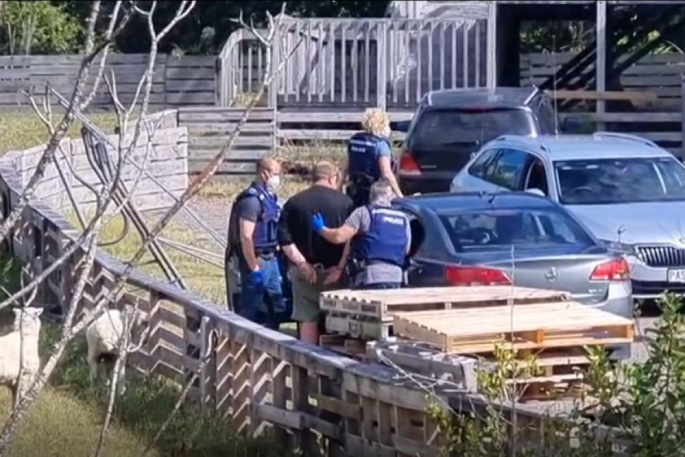A man who made online threats to “string ... up” former Prime Minister Jacinda Ardern and wrote about building gallows presented “legal gobbledygook” in his defence, a judge said.
Richard Trevor Sivell was yesterday convicted at a judge-alone trial of threatening to kill Ardern between November 26, 2021, and January 19, 2022, when she was still Prime Minister.
He was also convicted on two charges of obstructing police by refusing to come out of his caravan when they raided his Te Puke property in March 2022 and failing to provide the PIN for his seized mobile phone.
The Taupō 42-year-old represented himself when he appeared before Judge Christopher Harding in the Tauranga District Court.
Sivell handed up documents to the judge to support his request to have the charges dismissed, including a “notice of subjugation”.
Judge Harding described the documents as “legal gobbledygook”.
Sivell, whose trial was delayed after he was bailed and evaded arrest for 20 months, claimed he had not received full disclosure from police and needed more time, but was told he was given the disclosure three times.
“All this delay is going to end today and we’re going to hear the evidence,” the judge said.
Police prosecutor Sergeant Sean Brennan called five police witnesses to give evidence.
He produced screenshots and audio recordings of Sivell making repeated death threats towards Ardern in posts on social media platform Telegram.
Brennan said the police case was that Sivell had made the threatening comments on an online public forum which were intended to influence others to share his views and police did not have to prove he intended to carry out the threat to kill Ardern.
Bay of Plenty police intelligence supervisor John Coleman told the court his role involved monitoring persons of interest for national security concerns within the district.
In November 2021, he received information via Crimestoppers that Sivell was making threats on a Telegram channel mainly used by Covid-19 conspiracy theorists.
He said Sivell posted threatening messages and voice recordings in chat groups about Ardern and others including politicians and officials involved in the Covid-19 response.
A recording of Sivell threatening to “hold the Prime Minister accountable at Nuremburg 2.0″ was among those played in court.

“We’re going to string you up and we’re going to hang you for crimes against humanity and ... destroying our country,” Sivell said in the recording.
He made other comments referring to Ardern as “Jezebel”, comparing her unfavourably to Hitler, saying she and others should “hang”, talking about firing squads and building gallows, and calling for the “public shaming” and execution of “compromised” media.
“We should put them in stocks and throw fruit at them ... then snap their necks.”
“I am going to hang these motherf*****s ...” he stated in one recording.
“You hear that Jezebel, we’re coming for you. I’ve got a noose with your name on it ...”
Detective Ian Searle, the officer in charge of the prosecution, told the court he spoke to Sivell in November 2021 and found him angry at the Government for the Covid 19 lockdowns, vaccines and non-vaccinated people losing their jobs. Sivell was warned but his online comments continued.
After his arrest, police found messages on his phone calling for Ardern to be “hung from a 5G tower”.
Sivell declined to give evidence but asked the prosecution witnesses whether they had proof he had directly threatened Ardern, and they replied no.
 Richard Sivell is arrested on his rural Te Puke property on March 29, 2022. Photo / Supplied
Richard Sivell is arrested on his rural Te Puke property on March 29, 2022. Photo / Supplied
Sivell submitted the police allegations of threatening to kill Ardern were “hearsay” and there was no direct proof of him having done so.
Searle said he executed a search warrant at Sivell’s rural Te Puke address on March 29, 2022.
He locked the door and police retreated after seeing a large knife and firearm within Sivell’s reach.
After several hours of failed negotiations, Sivell was arrested after he came out of the caravan to look at the search warrant, which had fallen on the ground.
He refused to make comments at the police station or give the PIN to his phone.
In court, Sivell questioned the validity of the search warrant after police confirmed it was not signed by a district court judge.
Judge Harding said it was “perfectly clear” the search warrant was legal and he was satisfied Sivell had deliberately obstructed the police and failed to comply with a lawful request to provide his phone PIN.
Regarding the threatening to kill charge, Judge Harding said he was satisfied the digital material police presented was generated by Sivell, who effectively acknowledged to police that was the case.
“When the comments are read collectively it is clear Mr Sivell was concerned about the Government’s processes and reactions to Covid matters and was making his views clear.”



0 comments
Leave a Comment
You must be logged in to make a comment.